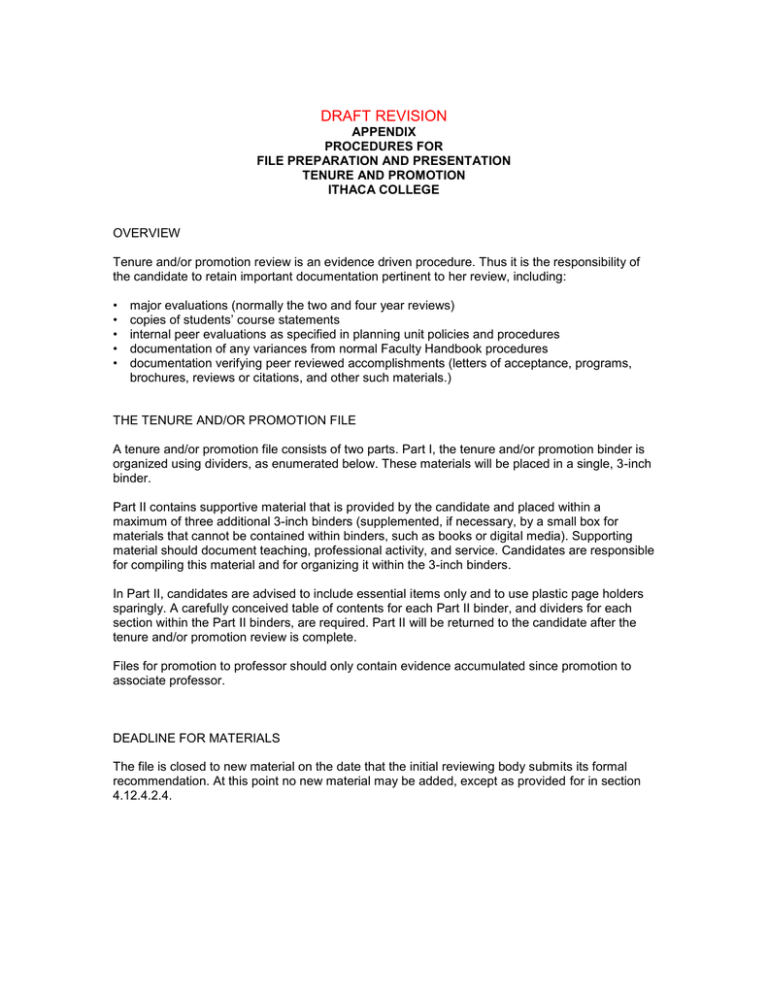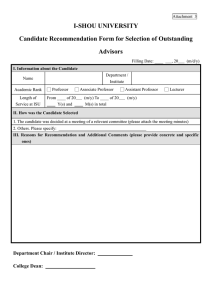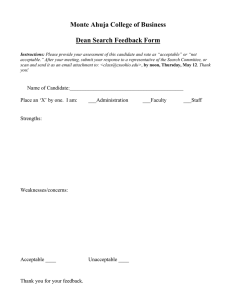Download Proposed Revision to T&P File Prep Procedure
advertisement

DRAFT REVISION APPENDIX PROCEDURES FOR FILE PREPARATION AND PRESENTATION TENURE AND PROMOTION ITHACA COLLEGE OVERVIEW Tenure and/or promotion review is an evidence driven procedure. Thus it is the responsibility of the candidate to retain important documentation pertinent to her review, including: • • • • • major evaluations (normally the two and four year reviews) copies of students’ course statements internal peer evaluations as specified in planning unit policies and procedures documentation of any variances from normal Faculty Handbook procedures documentation verifying peer reviewed accomplishments (letters of acceptance, programs, brochures, reviews or citations, and other such materials.) THE TENURE AND/OR PROMOTION FILE A tenure and/or promotion file consists of two parts. Part I, the tenure and/or promotion binder is organized using dividers, as enumerated below. These materials will be placed in a single, 3-inch binder. Part II contains supportive material that is provided by the candidate and placed within a maximum of three additional 3-inch binders (supplemented, if necessary, by a small box for materials that cannot be contained within binders, such as books or digital media). Supporting material should document teaching, professional activity, and service. Candidates are responsible for compiling this material and for organizing it within the 3-inch binders. In Part II, candidates are advised to include essential items only and to use plastic page holders sparingly. A carefully conceived table of contents for each Part II binder, and dividers for each section within the Part II binders, are required. Part II will be returned to the candidate after the tenure and/or promotion review is complete. Files for promotion to professor should only contain evidence accumulated since promotion to associate professor. DEADLINE FOR MATERIALS The file is closed to new material on the date that the initial reviewing body submits its formal recommendation. At this point no new material may be added, except as provided for in section 4.12.4.2.4. Part I—Tenure and/or Promotion Binder 1. Table of Contents, listing the items below. 2. Policies and Procedures for the Planning Unit and School 3. Statement on teaching, scholarship/professional activity, and service. This statement, drawing on documentation provided in the file, illustrates how the candidate meets the criteria for tenure and/or promotion in the context of criteria laid out in the Faculty Handbook, and interpreted in planning unit policies and procedures. The maximum length is ten double-spaced pages. 4. Curriculum vitae and verification of official transcript of highest completed degree. 5. Comprehensive Reviews This section must include all major formal evaluations (normally the 2-year and 4-year reviews) for tenure-eligible faculty. Inclusion of other reviews depends on school procedures. 6. Internal Peer Evaluations Include peer teaching evaluations (encompassing classroom visits and review of course syllabi), as specified in school or planning unit guidelines. 7. Student Statements For untenured faculty student statements from all semesters in the probationary period, must be included. For tenured faculty or NTEN faculty seeking promotion, student statements for all classes for the three years immediately preceding review must be included. Student statements can be placed in a separate 3-ring binder labeled Section lA if necessary. 8. Evaluative Letters From Qualified Peers External to Ithaca College Concerning Scholarly/Professional Activity Evaluative letters from colleagues external to Ithaca College provide expert objective assessments of the candidate's scholarly/professional activity by peers who are provided appropriate context for their assessment. There should be five from academic peers at or above the rank for which the candidate is being considered (or, if rank is not an appropriate consideration, professional colleagues of comparable or greater stature). In rare cases, where appropriate, academic peers selected may be below the rank for which the candidate is being considered. In such cases the reasons for selecting these peers, despite their rank, should be fully indicated by the candidate. Where appropriate, successful and highly regarded individuals outside academe may be solicited for external reviews. In this section of the file the candidate will provide on a single page, a brief description of each peer’s professional status, as well as the relationship, if any, to the candidate. These letters should be solicited in the following fashion: • The candidate submits to the dean and/ or planning unit representative (planning unit chair or chair of personnel committee, in most instances) the names of five potential outside reviewers including a brief paragraph on the professional status of the reviewer and the reviewer's relationship to the candidate. The candidate should not contact the potential outside reviewers. Again, the primary concern is to identify knowledgeable reviewers able to contribute to an informed, objective assessment of the candidate's work in the context of Ithaca College's tenure/promotion criteria. It is the responsibility of the dean and/or representative to help the candidate assemble an appropriate list of outside reviewers. The dean and/or representative will thus advise the candidate and work with her to finalize the list. This list must be submitted to the dean no later than April 1 of the year preceding the tenure and/ or promotion review. • At this point in the process the dean or dean's designee (planning unit chair or chair of personnel committee, in most instances) will contact the five potential outside reviewers by April 15 to determine willingness to provide an evaluative letter. If fewer than five outside reviewers agree to provide evaluative letters, the candidate will be notified and asked to identify within five working days additional potential outside reviewers. The candidate will not be informed which outside reviewers were unavailable. • By May 1 of the year preceding the tenure and/or promotion review the dean or designee will send letters to the outside reviewers soliciting confidential assessments. These letters should provide appropriate context to the outside reviewers, including as an attachment sections 4.12.2.3.1 from the Faculty Handbook, and planning unit policies that interpret and specify general Handbook standards as they apply in the candidate’s field. The common template that must be used for these letters is available in the dean's or provost's office. The letter must be included in the candidate’s file in the section containing external reviewers’ letters. • When sending the solicitation letter, the candidate's CV plus representative externally reviewed or peer reviewed or endorsed scholarly/professional/creative work (see Part II—Supporting material below) must be included. • Responsibility for acknowledging receipt of these letters is borne by the individual soliciting the letters. The solicitor may need to provide reminders to external evaluators and, if fewer than five letters are received by August 1, may need to meet again with the candidate and dean/designee to solicit additional letters. • The candidate will not read the outside reviewers’ letters. The letters will only be read by appropriate individuals or committees that are part of the formal review process. The letters become the property of the dean's office. If excerpts from these letters are cited in written recommendations, the authors' names or other identifiers should not be included to help ensure confidentiality. 9. Evaluative Letters from Alumni Concerning Teaching Letters from alumni should provide substantive assessments of the learning experience. There should be at least eight and no more than ten letters from alumni preferably representing the span of years for which the candidate is undergoing review. These letters are to be solicited in the following fashion: • The candidate, in consultation with the planning unit (planning unit chair or chair of the personnel committee, in most instances), submits to the dean the names of at least eight and not more than ten former students. No alumnus may be solicited who is enrolled at Ithaca College at the time the letter is provided. This list must be submitted not later than April 1 of the year preceding the tenure and/or promotion evaluation. If fewer than eight alumni agree to provide evaluative letters, the candidate will identify additional potential alumni within five working days of being notified that additional letters are needed. The candidate should not be informed which alumni were unavailable. • These letters should provide appropriate context to the alumni for the review. A common template for these letters will be available in the dean's or provost's office. Responsibility for acknowledging receipt of these letters is borne by the individual soliciting the letters. The solicitor may need to provide reminders to alumni and, if fewer than eight letters are received by August 1, may need to meet again with the candidate and dean/designee to solicit additional letters. • The candidate will not read the alumni letters. The letters will be read only by appropriate individuals or committees that are part of the formal review process. The letters become the property of the dean's office. If excerpts of these letters are cited in written recommendations, the authors' names or other identifiers should not be included to ensure confidentiality. 10. Evaluative Letters Concerning Service The number of these letters will necessarily vary depending upon each candidate’s service opportunities and choices. Letters from individuals within and outside the College should provide substantive assessments of service to the college, profession, and—if the candidate has elected to do so—service to the Ithaca community. There should be at least three letters, preferably representing the span of years for which the candidate is undergoing review. These letters are to be solicited in the following fashion: • The candidate, in consultation with the planning unit (planning unit chair or chair of the personnel committee, in most instances), submits to the dean the names of several potential people he/she wishes to be solicited. This list must be submitted not later than April 1 of the year preceding the tenure evaluation. • The dean or designee will send letters to people whose names have been submitted by the candidate, soliciting confidential assessments by a specific date. These letters should provide appropriate context for the review. A common template for these letters will be available in the dean's or provost's office. • Responsibility for acknowledging receipt of these letters is borne by the individual soliciting the letters. The solicitor may need to provide reminders to the letter writers concerning service and, if fewer than five letters are received by August 1, may need to meet again with the candidate and dean/designee to solicit additional letters. • The candidate will not read the evaluative letters concerning service. The letters will be read only by appropriate individuals or committees that are part of the formal review process. The letters become the property of the dean's office. If excerpts of these letters are cited in written recommendations, the authors' names or other identifiers should not be included to ensure confidentiality. 11. Recommendation by the Planning Unit (where appropriate) This recommendation will be based on an independent review of the candidate's teaching, scholarly/professional activity, and service as documented in the file. The recommendation will include the vote, date of the action, and signatures of voting planning unit members (or committee), as well as the basis and justification for the action. It is especially important to identify and explain any apparent discrepancies between the college's stated criteria for tenure and/or promotion and contrary evidence in the file (maximum length not to exceed ten double-spaced pages). 12. Recommendation by the Planning Unit Chair (where appropriate) This recommendation will be based on an independent review of the candidate's teaching, scholarly/professional activity, and service, providing the basis and justification for the recommendation (maximum length not to exceed ten double-spaced pages). 13. Recommendation by the School Tenure and Promotion Committee (where appropriate) This recommendation will be based on an independent review of the candidate's teaching, scholarly/professional activity, and service as documented in the file. The recommendation will include the vote, date of the recommendation, and signatures of voting committee members, as well as the basis and justification for the recommendation. It is especially important to identify and explain any apparent discrepancies between the college's stated criteria for tenure and/or promotion and contrary evidence in the file (maximum length not to exceed ten double-spaced pages). 14. Recommendation by the Dean This recommendation will be based on an independent review of the candidate's teaching, scholarly/professional activity, and service as documented in the file, and will provide the basis and justification for the action. The Dean’s recommendation will take into consideration the curriculum and enrollment needs of the school (maximum length not to exceed ten double spaced pages). Consistent with college or school policy, the dean's office or planning unit is responsible for maintaining and submitting the other personnel documents to be included in Part I, including any prior comprehensive reviews, internal peer evaluations, student statements, and all confidential letters solicited by the dean and/or planning unit representative on behalf of the candidate. The dean or planning unit will add these personnel documents to appropriate sections of Part I in the binder. Part I will remain the property of the dean's office or planning unit after the tenure and/or promotion review is complete. With the exception of the curriculum vitae, files for promotion to professor should only contain evidence accumulated since promotion to associate professor. Part II—Supporting Materials SUPPORTING MATERIALS TO DOCUMENT TEACHING ACTIVITY Candidates may include instructional materials which provide an indication of the range of classes and number of students they teach, the kinds of assignments they give, the manner in which they evaluate student work and assess student learning, the way in which they design and develop courses, and additional activities that they perform to supplement their teaching. For example, candidates may include: • • • • • • representative syllabi course proposals sample assignments or exams reflections upon their teaching graded student drafts or completed essays information about Web sites they have developed for courses. Candidates may also choose to provide evidence of their former students' professional success, including graduate study. They may also include personal notes from students and evidence of their advising activities. However, candidates are urged to be selective, choosing representative material that supports the opening statement about teaching. SUPPORTING MATERIALS TO DOCUMENT SCHOLARSHIP/PROFESSIONAL ACTIVITY Materials to document scholarship/professional activity includes evidence of externally peer reviewed or endorsed work or artistic endeavors. Peer Reviewed Work Externally peer reviewed or endorsed work may include, but is not limited to, the following: articles, papers, books, textbooks, anthologies, collections, bibliographies, treatises, chapters in larger works, reviews or citations, instructional materials, computer programs, compact discs, tapes, photographs, reviews, clinical reports, journalistic articles, posters, presentations, abstracts, and creative work. Successful grant applications should be included. Jointly published, refereed work with students should be identified specifically. Works "in press" (externally peer reviewed for publication and in the process of being published), labeled accordingly, should be included. Evidence of externally peer reviewed or endorsed artistic endeavor also may include, but is not limited to the following: programs, announcements, brochures and letters of invitation. Non-Peer Reviewed Work Externally peer reviewed or endorsed work provides the most persuasive verification of achievement in the area of scholarly/professional activity. However, non-peer reviewed work may be included in Binder Two, labeled accordingly. Non-peer reviewed work and evidence of nonpeer reviewed artistic endeavor may include any of the examples listed previously under Peer Reviewed Work. Works "in progress or in preparation,” namely work that has not been externally peer reviewed or endorsed and is not in the process of being published or exhibited, should not be included, although it could be listed on the vitae in a separate category, labeled accordingly. Candidates are urged to be selective in including non-peer reviewed evidence. SUPPORTING MATERIAL TO DOCUMENT SERVICE Documentation for tenure and/or promotion includes evidence of service to the planning unit, school, college, community, and the profession, as supported by evaluative letters concerning service (see 6 above). Supplementary evidence to document service may also include, but is not limited to the following: brochures, programs, project reports, copies of service presentations, job descriptions and/or project achievements for offices held, and unsolicited letters of invitation or appreciation. IMPLEMENTATION AND AMENDMENT These procedures will be in effect for all tenure-eligible faculty and for all non-tenure eligible notice faculty seeking promotion who begin their appointment after approval of these procedures. Other tenure-eligible faculty hired prior to approval will have the option of using this document or the previous guidelines statement that is currently in effect. All faculty seeking promotion to professor will use these procedures beginning in fall 201?. Procedures to amend this document are the same as those to amend the Faculty Handbook (Policy Manual IV).

